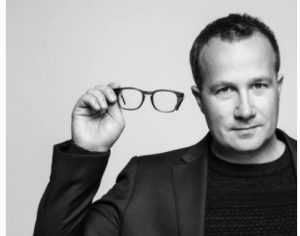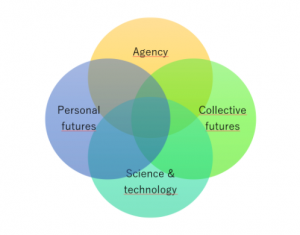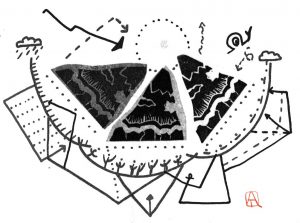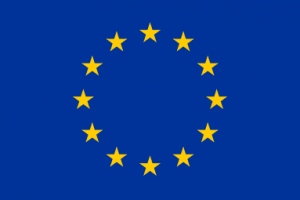Talking about open schooling might seem easier than it actually is. These two words are not difficult ones, but when they come together they unfold a new world of possibilities, that oftentimes, we are not always ready or prepare to grasp.
That´s why events like this one, a one-day workshop at a science engagement conference, the Ecsite conference, are so welcome, especially for our project, which aims to contribute with its deep questions, answers, and ideas to the education that is done daily at schools. I invite you to discover how 5 European projects are doing big and creative efforts to move away from echo chambers and take an active approach to education that is more collaborative and adaptative, and therefore, practising open schooling.
First things first: the workshop was organised by the Open Schooling Together group - a partnership of eight European projects on Open Schooling. The aim was to gain inspiration and reflect together, through a collection of talks, a period of reflection and some practical exercises.
Concepts such as boundaries, co-creation, stakeholders engagement, evaluation and sustainability were part of the conversations. It was clear to me that we had a lot in common.
Each project has its own approach but brings this collage of active hope for an education that embraces the important challenges we face, making students confident about their agency capacity and their possibilities to shape a more inclusive, fair and better social system for everyone.
I invite you to explore, discover the new tools, and get in touch with these projects and hopefully, we will meet at the next meeting of the Open Schooling Together group!
https://www.schoolsaslivinglabs.eu/
https://www.connect-science.net/
“How do you talk about something that is bigger than language? What words do you choose when a scientist shows you how everything will change in the next 100 years? How the glaciers will vanish, and become the ocean, how the ocean will rise and swallow coastal areas, while the pH of the oceans, the acidity will change more than it has in the previous 50 million years? How do you understand 50 million years? How do you understand that 0.3 in the logarithmic scale of the pH levels? 50 million years are too big to register, 0.3 in pH too small and abstract to understand. A person born today can measure in his lifetime greater changes in the oceans than, not only the whole evolution of man but ten times that. Such change is not just historical, you could say it’s mythological”.
-Andri Snær Magnason, The white noise of climate change.
(The language of climate change), in Levrini O., Tasquier G., Amin T., Branchetti L., Levin M. (Eds.) (2021) Engaging with Contemporary Challenges through Science Education Research: Selected Papers from the ESERA 2019 Conference. Springer Springer Nature Switzerland AG

One year after its beginning, the FEDORA partnership organises the first International Event to publicly present the project.
For this occasion, we have invited the Icelandic writer Andri Snær Magnason whose work has been deeply inspiring to FEDORA's research. With its books and documentaries, the writer is providing a great contribution to describing the graveness of the global changes that are impacting not only the climate and our material lives but also our same imagination and the ways that humans have elaborated to think and describe changes.
The author, internationally renowned, whose books have been published in more than 20 languages, will give an online conference on Tuesday, September 14th (4.30-6.30 pm CEST). The event is organized by the FEDORA partnership and is hosted by the Department of Physics and Astronomy “A. Righi” of the University of Bologna (Italy) as part of the program of a summer school on storytelling in science titled “Officina di Narrazione della Scienza” (Laboratory for the Narrative of Science). The event will be held in English.
During the conference, Andri Snær Magnason will conduct the audience in a journey “On Time and Water”, as his last work is titled, showing the power of the narratives and imagination to understand “something that is bigger than language”. Indeed, as he writes in his abstract of the seminar “During the next 100 years we expect to see a fundamental change of all the elements of water on our planet. Many glaciers will melt and the sea levels will rise at a faster rate than has been seen before. Acidification will bring the oceans to a pH level not seen in 30 million years. Patterns of rain and snow will change dramatically in most areas. We could say that nature is not changing in geological speed anymore but entering human speed. This extreme shift is larger than any metaphor or any words or language we are used to. We could say that this issue is so large that it swallows all words and meaning. We hear words like “climate change” but for most people, they are just white noise, 99% of the real meaning is not included in our imagination. To describe a black hole you look at the surrounding galaxies and to understand these issues Andri weaves a web of stories from mythology, to his grandmother’s honeymoon on Europe’s largest glacier, to our understanding of our intimate time. The huge narrative emerging from this web of stories should be a source of inspiration and motivation for all scientific studies in the next decades.”
After the welcome from the Director of the Department of Physics and Astronomy, Andrea Cimatti, and before the talk of Andri Snær Magnason, the coordinator of FEDORA, Olivia Levrini, will introduce the core ideas of the project. The event will be closed with a contribution by Sibel Erduran, local coordinator in FEDORA of the University of Oxford and president of the European Science Education Researchers Association (ESERA). She will provide points for reflection about the connections between Magnason’s work and the latest advances in science education research.
The speakers will then be happy to receive comments and questions.
Program
Practical information
The participation is free of charge after registering at this link. The event can be attended either remotely or face-to-face (Aula Magna, Department of Physics and Astronomy “A. Righi”, Via Irnerio 46, Bologna, 100 people maximum and with the COVID-19 green pass). During the registration, the participant can choose the preferred modality and will receive the instruction for the online
Biographical notes
Andri Snær Magnason is an Icelandic writer born in Reykjavik. His book, On Time and Water is coming out in 32 languages in 2020 and 2021, exploring the language of climate change and why data and science have not reached our souls or policy. Andri is a writer of fiction, non-fiction, poetry, plays and documentary films. His book LoveStar won the Philip K. Dick special citation in 2014 and Le Grand Prix de l’Imaginaire in France 2016. His children’s book, The Story of the Blue Planet was the first children’s book to win the Icelandic literary award and has been published in 32 languages. His book Dreamland, a Self Help Manual for a Frightened Nation has contributed to a new energy policy in Iceland and the vision of the Highland National Park in the Central Highlands of Iceland. Andri Snær Magnason ran for president in Iceland in 2016 and came third in the election. His documentary films, Dreamland, The Hero's Journey to the Third Pole and Apausalypse have travelled to film festivals worldwide.
FEDORA is proud to launch its new communications product: a sweet and nice video that presents in two and a half minutes what is the project about and why is it so relevant.
We hope you will like it and share it among your networks!
FEDORA is ready to present her first results at the ESERA2021 conference that will be held online from August 30th to September 3rd. ESERA means the European Science Education Research Association and the conferences of this association are organized biannually. They are currently the most important and most attended appointments occurring in Europe for researchers in science education who come not only from Europe but from all over the world. The 2021 edition is organized by the University of Minho (Portugal). In the 2019 edition, held in Bologna (Italy), more than 1600 researchers participated. Professor Sibel Erduran, the coordinator for the University of Oxford in FEDORA, is currently serving as the president of this huge and prestigious association.
FEDORA will present at the 2021 edition a poster and three oral presentations that report some results of studies that ground their roots in the Erasmus + project I SEE and are, then, further developed within the framework of the third Work Package (WP3) of FEDORA, whose aim is to “futurize science education”.
The titles of the presentations are:
- A FRAMEWORK FOR ANALYSING STUDENTS’ FUTURE PERCEPTIONS RELATED TO AGENCY, SCIENCE, AND TECHNOLOGY. Antti Laherto, Tapio Rasa, Giulia Tasquier, Martina Caramaschi, Erica Bol, Els Dragt, Olivia Levrini.
- BROADENING PERCEPTIONS OF FUTURE, TECHNOLOGY AND AGENCY: STUDENTS’ EXPERIENCES FROM A MODULE ON FUTURES THINKING AND QUANTUM COMPUTING. Tapio Rasa, Antti Laherto, Elina Palmgren.
- NETLOGO “TOY” SIMULATIONS AS LABORATORIES TO IMAGINE THE FUTURES. Eleonora Barelli, Olivia Levrini.
ESERA delegates can watch the prerecorded videos in advance and participate in the live session for discussion that is scheduled on the first day of the conference, Monday, August 30th, at 12.30 am (CEST).
We do hope to receive many comments from the ESERA participants so as to go on developing more and more effective science teaching approaches that can support the young to imagine and build their desirable futures.
FEDORA envisions a radical transformation of contemporary schooling such that students can be equipped with those skills that will help them manage their future lives and the uncertainty that they entail. How can such a vision be implemented? How can educational reform be structured to enact such a vision?
A key set of contributors who have the decision-making power in addressing such questions are policy-makers. Policymakers are individuals in the different national contexts of the project who influence policies about curriculum, assessment and teacher training to name a few. When the Oxford team asked the UK policy stakeholders what they themselves view as competencies that could frame future-oriented science education, they referred to the need to shift away from a knowledge-rich curriculum towards more cross-cutting, contextual and interdisciplinary approaches.
But how can such competencies be assessed? How can educational systems be re-calibrated to align such ambitious visions with the reality of high-stakes assessments in science education? Reforming the science curriculum and pedagogy without a coherent alignment in reform about assessment, such visions are likely to fall short. How can national and high-stakes examinations be designed to align curriculum, instruction and assessment? The Oxford team and FEDORA Work Package 5 will be posing such questions to policymakers and developing some recommendations at a national, as well as cross-national level. Watch this space!
A lack of stable future horizons, caused by global crises and accelerating societal and technological development, obscure young people’s relationship with the future. At the same time, future-oriented transformative actions are needed more than ever. Science education has a significant potential to provide students with tools for connecting with, and finding agency within, their personal as well as collective futures. Science education is also a natural context for young people to examine their hopes and fears regarding technology, linking the transformative power of technological development to human value-based agency.
To address these issues while leveraging their interconnections, FEDORA Work Package 3 titled “Futurizing science education - Analysis of Blind spot 3”, has set out to analyse young people’s perceptions of the future in relation to science and technology. Building on earlier initiatives to develop future-oriented science education, we have developed an analytical framework interconnecting literature on science education, futures studies, youth studies, science and technology studies and educational studies on agency. The goal is to collect information to represent students’ conceptions in and between the domains of personal futures, collective futures, agency, and science & technology.
The FEDORA consortium has launched four part-studies employing the framework, each focusing on some domains and their connections presented in Figure 1. The partners are currently working to compile the preliminary results, integrate and interpret them using the shared framework, and come up with research-based recommendations to be used when developing future-oriented science education modules during the second project year. Stay tuned!

Figure 1. The domains of students’ perceptions under investigation in FEDORA: personal and societal/global (‘collective’) futures, agency, and science & technology. The empirical research in FEDORA focuses especially on the interrelations (overlaps) between these domains.
Cycles are part of life, and it resembles a circular path the fact that we are now, as researchers and science education professionals, seeking to get outside the classroom in pursuit of innovative ways for meaningful education.
Open schooling wants to reach beyond the walls of the classroom and its school, and create a beautiful entanglement with the communities that inhabit its territory. It will be in the establishment of these relations where discoveries and the sense of meaning have more chances to flourish.
This is why on June 3rd two European projects, SEAS - Science Education for Action and Engagement towards Sustainability - and FEDORA - Future-Oriented Science EDucation to enhance Responsibility and engagement in the society of Acceleration and uncertainty - got together to dialogue and see the possible synergies between both approaches. While SEAS is in its final stages, FEDORA has just begun. This enables SEAS and its team to inherit their learnings and frameworks to the new and energetic FEDORA team.
In the words of Alfredo Jornet, member of the SEAS coordinator team from the University of Oslo, “we’ve been studying the disentanglement between knowledge and action, and finding the ways to bring them back together: knowing and understanding with acting and doing”. On the other hand, Olivia Levrini, FEDORA's Coordinator, stated "Learning from SEAS experience and findings will enrich our approach and it will certainly help overcome the disparities".
How does an Open Schooling approach will help to address the complex challenges posed to our societies? What types of scientific knowledge and skills do the future generation need to confront and make a change to dealing with contemporary challenges?
The joint SEAS-FEDORA approach to Open Schooling envisioned STEM education as a powerful driver of social change with high transformational potentials.
The next steps, shared by Giulia Tasquier, who is involved in both projects, will be organising focused working groups and keeping the conversations flowing among both projects.
"...summoning up your memories one by one, your wolf will have become another wolf, your sister a different sister, your battle other battles, on your return from Euphemia,
the city where memory is traded at every solstice and every equinox." - Italo Calvino, Invisible Cities.
When we designed the proposal and planned a study group on interdisciplinarity - FEDORA first blind spot - we imagined ourselves in a two-day long residential workshop in Bertinoro. It is a beautiful location in the hills, not far from Bologna, called "the Balcony of Romagna" for its breathtaking view of the sea and the mountain. We imagined ourselves, a group of people with very different backgrounds, to share words, knowledge, pieces of experience in the castle that dominates the town and hosts the University Residential Centre and the Interreligious Museum. We were sure that the authentic restaurants, famous for their "piadina and Sangiovese" (a typical bread and red wine), would have facilitated our interactions.
The idea was to create a trading zone where interdisciplinarity was not the theme of academic discussions but an actual practice, a live learning mechanism that we had to activate to know each other and share methods and languages to reason on knowledge generation and organisation. A facilitator would have been in charge of analysing our dynamics and languages and representing them visually.
Instead, contingencies like a pandemic made future diverge from plans, and we found ourselves organising the study group on Zoom and searching for other ways to set up a trading zone.
In preparation for the online meeting, we shared metaphors, images, stories, experiences…
Despite the insufficient logistic context, an incredibly rich bunch of ideas emerged. Framed by the papers of Akkerman and Bakker on boundary crossing and objects, and by the Family Resemblance Approach, developed by Sibel Erduran, Zoubeida R. Dagher and colleagues, we have been inspired by the Gaelic word "meitheal", the performances of Gandini Juggling, and by The city of Euphemia by Calvino (The invisible cities).
In this virtual context, we explored the multi-dimensional roles of disciplines, the barriers they create, and their pros in structuring reasoning and mediating the interaction. We then challenged ourselves by wondering what attitudes and skills are needed to accept the risk of crossing boundaries and have an authentic experience as boundary people.
A great resonance in the group emerged around the idea that interdisciplinarity in STEM education implies not only managing tensions between belonging-nonbelonging, defining-negotiating meaning, going in-out a comfort zone, zooming in-zooming out (from details to big pictures and vice versa). It also entails managing a particular kind of equilibrium that we called "between sense-making skills (systems, critical, analytical thinking) and strange-making skills (creative, imaginative, anticipative thinking)."
What forms of epistemic practices and knowledge organisation, what facilitation scaffolding is needed to educate pupils, teachers, educators and ourselves to manage such an equilibrium?
These questions are our challenges for the next steps of our researches and discussions that, for sure, we will continue in newer and newer modalities and in a continuous search for inspiring logistic contexts.
One of the inspirations that led the FEDORA team to put together the ideas and essence for this project, was the work of the philosopher, sociologist and politologist Hartmut Rosa. His view of our society as a society of acceleration led us to think of the misalignments that this acceleration produced in the way science is taught in formal spaces.
Hartmut Rosa was recently invited to the “Future Congress”, a yearly event organised by several organisations in Chile. This year, his presentation was online and it is accessible here.
In his 16-minute talk, Rosa describes his societal interpretations, focusing on his theory of desire for control, which in his view has two main aspects. One is cultural, and here he sees a never-fulfilled human desire for more reach. The idea of the good life is steered by what he describes the 3 As: available, accessible and attainable. The desire for more control. Reach more visibility of the space and also at microscopes, in our body. We want to increase the horizon of reach, physically, and access there. And once we are there, think of colonialism, get control of the territory, gain control over things: our body, matter, politics, and then use these things. Increase the horizon of what we can get available, attainable and accessible, and there, money has a huge role to play.
About the paradox that happens while doing this, he states that by trying to control more, we lose more control, and more powerful ideas, hit the play button!

Although benchmarking is an expression that comes from the business world, scoping and signalising what the competition is doing and what level of development they are, its practice has gone beyond this area. Different disciplines use it as a way of mapping the beginning of a study or project.
In FEDORA, we see the need of depicting different approaches that can be linked to the blind spots that we have recognised, especially when we consider coming up with new narratives for science education. That’s why one of our partners, formicablu, prepared an internal work document called Benchmark of existing examples of cross-media and innovative science communication. It aims to map the state of the art and the resources that we, as a project consortium, consider valuable as inspiration and informing sources for the different steps in the project.
We recognise the formality, hierarchy and intended neutrality in the languages usually adopted to teach science and address complex and uncertain issues. Therefore, it is essential to explore and propose new imaginative narrative languages in this era of acceleration, one of our ethe as a project. As stated in the document, this is not a linear task, and there are not many ready-to-use available resources to rely on.
How did we benchmark the “narratives for science education” landscape? Our methodology considered desk research, a survey among our partners, and two consultation events, which led to crowdsourced expert information. One of the events was a 40-minute session during FEDORA Kick-off and the second event was a two-hour workshop. These phases led us to a body of resources that considers 20 European projects, 33 books, 25 websites, 23 films, nine opinion articles and five databases as a starting point.
The iterative and co-creative character of FEDORA places this benchmarking as a starting point that will be continuously reviewed, revisited and enriched, enabling us to prototype a range of new and diverse possibilities within the consortium and then, in a subsequent step, with the involvement of other experts and professionals.
By addressing this blind spot, we aim to equip teachers, teacher trainers, and students with linguistic, argumentative, and imaginative thinking skills. We consider these skills valuable to face contemporary challenges and provide them with languages, frameworks and conceptual tools to innovate and futurise science education.
